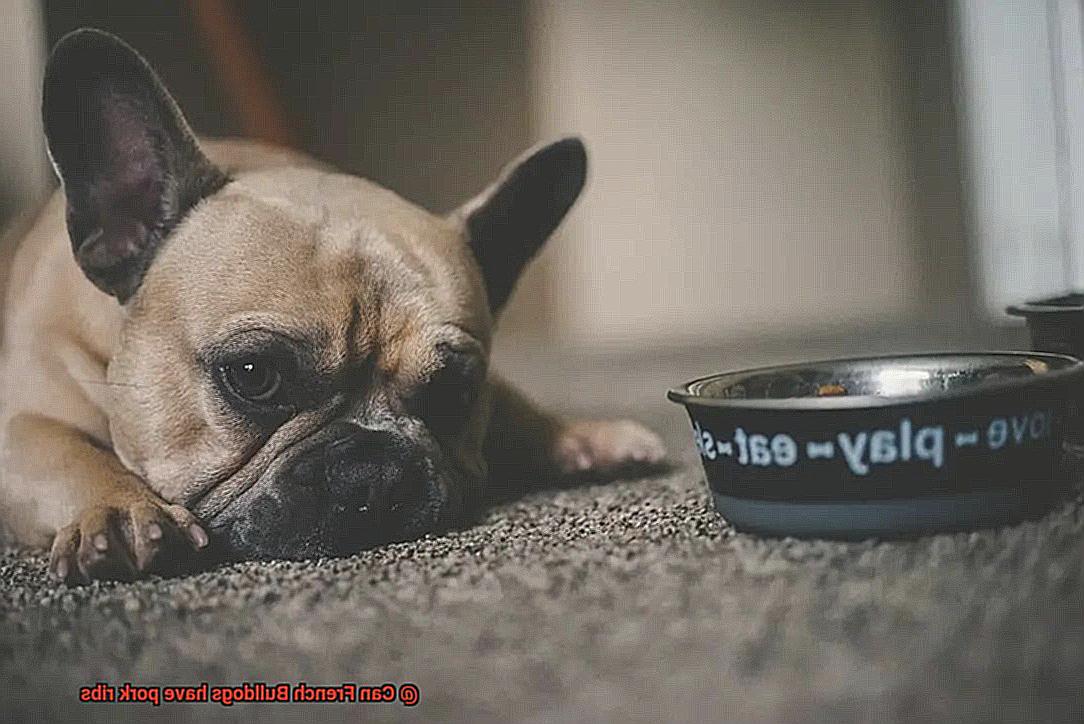Can French Bulldogs have pork ribs?
French Bulldogs, those little bundles of joy with their adorable faces and quirky personalities, have stolen our hearts. As devoted pet parents, we’re always on a mission to keep them happy and healthy, which means paying attention to what goes into their bellies. Today, we’re tackling a burning question: can our four-legged pals indulge in mouthwatering pork ribs?
French Bulldogs may share some similarities with other breeds, but they come with their own set of unique needs. These pint-sized pups have sensitive tummies and are prone to certain health issues. So before you toss them a rib bone, let’s dig into the meaty details.
Now, let’s talk bones – the main concern when it comes to pork ribs. Dogs have an innate desire to gnaw on bones, but if not handled correctly, those seemingly harmless ribs can turn into a major hazard. The bones from pork ribs can splinter and cause choking or internal damage for your furry friend.
To make an informed decision about whether pork ribs are safe for French Bulldogs, we need to consider some crucial factors. By understanding the potential risks and exploring alternative options, we’ll ensure our pup’s safety while still satisfying their taste buds.
In the following sections, we’ll dive deep into the nutritional needs of French Bulldogs, uncover safer alternatives to pork ribs that will make their tails wag with delight, and equip you with all the knowledge you need to make educated choices about your fur baby’s diet. After all, a well-fed French Bulldog is a happy one. So let’s embark on this culinary adventure together and discover how to keep our beloved companions healthy and contented.
The Potential Risks of Feeding French Bulldogs Pork Ribs
Contents
- 1 The Potential Risks of Feeding French Bulldogs Pork Ribs
- 2 How to Safely Feed French Bulldogs Pork Ribs
- 3 Removing Bones from the Meat for French Bulldogs
- 4 Seasonings and Cooking Methods to Avoid When Preparing Pork Ribs
- 5 The Importance of Portion Control With Pork Ribs for French Bulldogs
- 6 Health Issues That Can Arise From Excessive Consumption of Fatty Meats
- 7 Tips for Making Sure Your French Bulldog Enjoys Their Treat Responsibly
- 8 Conclusion
French Bulldogs are adorable and beloved companions, known for their playful personalities and distinctive appearance. As pet owners, it is our responsibility to ensure their health and well-being, which includes understanding the potential risks of certain foods. In this article, we will explore the dangers of feeding French Bulldogs pork ribs and why it’s essential to be aware of these risks before incorporating them into their diet.

High Fat Content and Weight Gain:
Pork ribs are delicious for humans, but they can be problematic for French Bulldogs. These little four-legged friends have specific dietary requirements and sensitivities that make consuming high-fat foods like pork ribs a potential risk. French Bulldogs are prone to weight gain and obesity, which can lead to numerous health issues such as joint pain, breathing difficulties, and heart conditions.
Pancreatitis:
One of the significant concerns with feeding French Bulldogs pork ribs is the potential for pancreatitis. This condition occurs when the pancreas becomes inflamed due to the consumption of fatty foods. Pork ribs, being rich in fat, can trigger pancreatitis in French Bulldogs. The symptoms of pancreatitis include severe abdominal pain, vomiting, and diarrhea – a painful experience for your furry companion.
Digestive Issues and Bone Hazards:
French Bulldogs have sensitive digestive systems that may struggle to digest the bones in pork ribs. Consuming these bones can lead to gastrointestinal obstructions or injuries, posing serious health risks for your beloved pet. The small bone fragments in pork ribs can splinter easily when cooked, making them a choking hazard or causing blockages in your dog’s digestive system.
Bacterial Contamination:
Raw or undercooked pork ribs pose another danger to French Bulldogs – bacterial contamination. Pork can contain harmful bacteria like Salmonella or E.coli, which can cause food poisoning in dogs. These infections can result in symptoms such as vomiting, diarrhea, and dehydration. Therefore, it is crucial to ensure that pork ribs are thoroughly cooked before offering them to your French Bulldog.
Safe Alternatives:
While pork ribs may not be the best choice for your French Bulldog’s diet, there are plenty of safer alternatives to consider. Lean meats like chicken or turkey, cooked without seasoning or bones, can be a healthier option. Additionally, specially formulated dog treats that meet your French Bulldog’s nutritional needs are widely available in pet stores.
How to Safely Feed French Bulldogs Pork Ribs
In this article, we will guide you on how to safely feed pork ribs to your French Bulldog, taking into account their unique body shape, size, and health conditions.
Choose the Right Size Ribs:
French Bulldogs have a stocky build and a short snout, which can make it challenging for them to chew and digest large bones. Opt for smaller ribs that are more manageable for your French Bulldog. This ensures they can comfortably chew and swallow without any risk of choking.
Keep it Simple:
When preparing pork ribs for your French Bulldog, avoid using spices, seasonings, or marinades that may be harmful to them. Ingredients like garlic, onion, and certain spices can cause digestive issues or even be toxic to dogs. Stick to plain, unseasoned pork ribs to keep them safe and satisfied.
Cook Thoroughly:
Raw or undercooked pork can harbor harmful bacteria like Salmonella or E. coli, posing a health risk to your French Bulldog. Ensure that the pork ribs are cooked thoroughly at a high temperature to eliminate any potential bacteria. This step is crucial in preventing food poisoning and maintaining your dog’s well-being.
Portion Control:
French Bulldogs have a tendency to gain weight easily, so it’s important to control their portion sizes when feeding them pork ribs. While these treats are delicious, offering them in moderation prevents weight gain and associated health issues such as joint pain and heart conditions.
Monitor for Reactions:
Every French Bulldog is unique, and some dogs may have sensitivities or allergies to certain proteins found in pork. After feeding pork ribs, observe your dog for any signs of discomfort, vomiting, diarrhea, or changes in behavior. If you notice any adverse reactions, discontinue feeding pork ribs and consult your veterinarian.
Removing Bones from the Meat for French Bulldogs
Are you ready to learn all about the importance of removing bones from pork ribs before feeding them to your furry friends? Well, you’ve come to the right place. As an expert in French Bulldog care, I’m here to share my knowledge and experience with you. So, let’s dig in (pun intended).
Why Removing Bones is Crucial
French Bulldogs are adorable little creatures with big hearts (and appetites). But did you know that their unique anatomy puts them at a higher risk of choking and dental issues? That’s right. Their shorter snouts and smaller jaws make it harder for them to chew and swallow bones safely. So, it’s essential to remove those bones from the meat to keep your Frenchie happy and healthy.
How to Safely Remove Bones
Now that you understand why removing bones is vital, let’s talk about how to do it properly. First things first, get boneless pork ribs or prepare them yourself. Take a close look at the meat and use your trusty fingers or clean tweezers to carefully remove any visible bones. Remember, attention to detail is key here. Take your time, and don’t forget to watch out for those sneaky small bones that can cause trouble.
Boneless Alternatives: Yummy and Safe
If removing bones seems like a hassle or you’re unsure about doing it yourself, don’t worry. There are plenty of boneless alternatives available for your French Bulldog’s delight. Opt for boneless cuts of pork that still provide all the tasty goodness without any bone-related risks. Your Frenchie will thank you for it.
Consult with Your Vet
When it comes to your French Bulldog’s health, it’s always a good idea to consult with your veterinarian. They can provide valuable advice on suitable boneless options and address any concerns you may have. Your vet is your go-to source for all things related to your Frenchie’s well-being.
Conclusion

In conclusion, removing bones from pork ribs before feeding them to your French Bulldog is a crucial step in ensuring their safety and happiness. These little cuties deserve the best, so take the time to carefully remove all bones or opt for boneless alternatives. Remember, their unique anatomy makes them more prone to choking and dental issues, so let’s keep those adorable smiles intact.
Seasonings and Cooking Methods to Avoid When Preparing Pork Ribs
French Bulldogs are adorable and lovable companions that deserve the best when it comes to their diet and overall well-being. While pork ribs can be a tasty treat for our furry friends, it’s important to be aware of the seasonings and cooking methods that should be avoided to ensure their safety and health.
Say “No” to High Sodium Seasonings:
French Bulldogs, like many other dog breeds, are susceptible to digestive issues, including upset stomach and diarrhea. Seasonings that are high in sodium or contain artificial additives can exacerbate these problems. So, when preparing pork ribs for your French Bulldog, steer clear of ingredients like garlic powder, onion powder, salt-based rubs, and spice blends that might have harmful additives lurking within.
Skip Sugary Sauces and Marinades:
Excessive sugar consumption can lead to weight gain, dental problems, and even diabetes in dogs. Given that French Bulldogs are prone to obesity and other health issues, it’s crucial to keep their diet as healthy as possible. Therefore, avoid using sugary sauces or marinades when preparing pork ribs for your furry friend’s enjoyment.
Opt for Healthier Cooking Methods:
While it may be tempting to deep fry or pan-fry the ribs in oil for that extra crunch, these cooking methods introduce unnecessary fat into your French Bulldog’s diet. This excess fat can contribute to weight gain and other health problems. Instead, opt for healthier cooking methods such as baking or grilling the ribs without added oils or fats.
To summarize:
When it comes to preparing pork ribs for your French Bulldog’s delightful feast, prioritize their safety and well-being by avoiding seasonings high in sodium or artificial additives, sugary sauces or marinades, and unhealthy cooking methods. By doing so, you can ensure that your furry friend can enjoy this delicious treat without any adverse effects on their health.
The Importance of Portion Control With Pork Ribs for French Bulldogs
French Bulldogs are adorable, lovable companions that bring joy to our lives. But as responsible pet owners, it is crucial to be mindful of their health and well-being. One aspect of their diet that requires extra attention is portion control when it comes to feeding them pork ribs.
Prone to Obesity:
French Bulldogs are prone to obesity due to their genetic makeup and sedentary lifestyle. They have a tendency to overeat, and consuming excessive portions of pork ribs can quickly lead to weight gain. This excess weight can put strain on their joints and organs, leading to a range of health issues.
High Fat Content:
Pork ribs are delicious, but they are also high in fat. Too much fat in a dog’s diet can contribute to obesity and other complications such as pancreatitis. Pancreatitis is an inflammation of the pancreas that can be painful and potentially life-threatening for French Bulldogs.
Occasional Treat:
It is recommended to feed French Bulldogs small portions of pork ribs as an occasional treat rather than a regular part of their diet. This ensures that they receive the nutritional balance they need without overloading them with excess fat.
Appropriate Portion Sizes:
The size of the rib portion should be appropriate for your dog’s size and age. Puppies and smaller French Bulldogs may require smaller portions compared to adult or larger dogs. When in doubt, consult with your veterinarian or a canine nutritionist to determine the appropriate portion size for your furry friend.
Quality Matters:
When choosing pork ribs for your French Bulldog, opt for lean cuts and remove any excess fat before serving. This helps reduce the overall fat content in their diet and promotes a healthier eating habit.
Gastrointestinal Health:
Overfeeding pork ribs or any other high-fat food can lead to gastrointestinal upset in French Bulldogs. Symptoms may include diarrhea and vomiting, which can be uncomfortable for your furry friend. By practicing portion control, you can help prevent these digestive issues.
Weight Management:
Monitoring portion sizes is essential for maintaining a healthy weight in French Bulldogs. Obesity can lead to a range of health issues, including joint problems, breathing difficulties, and heart disease. By controlling their pork rib intake, you are taking an active role in preventing these obesity-related complications.
Health Issues That Can Arise From Excessive Consumption of Fatty Meats
We all know how much our furry friends enjoy their meals, especially when it comes to those delicious fatty meats like pork ribs. However, as responsible pet owners, it’s crucial to be aware of the potential health risks that excessive consumption of fatty meats can pose for our beloved Frenchies. In this blog post, we’ll dive into the health issues that can arise from indulging our furry friends a bit too much in these delectable treats.
Obesity: The Battle of the Bulge
Just like humans, French Bulldogs can easily fall victim to obesity if they consume too many fatty meats. These calorie-dense treats can pack on the pounds and lead to a myriad of health problems, including diabetes, heart disease, and joint issues. So, let’s keep those portion sizes in check and opt for leaner protein sources more often.
Pancreatitis: When Fat Becomes a Pain
One major concern with fatty meats is their potential to trigger pancreatitis in our French Bulldogs. This nasty inflammation of the pancreas can be extremely painful for our four-legged friends and even life-threatening. Symptoms such as vomiting, diarrhea, abdominal pain, and loss of appetite should never be ignored.

Gastrointestinal Woes: Grease Doesn’t Always Equal Goodness
Feasting on fatty meats can wreak havoc on our Frenchies’ sensitive stomachs. The high fat content can lead to digestive issues like diarrhea, bloating, and discomfort. Additionally, the greasiness of these meats can irritate their stomach lining and cause indigestion. Let’s spare our pups from tummy troubles by opting for leaner cuts.
Matters of the Heart: When Fat Hearts Break
Excessive consumption of fatty meats can increase the risk of heart disease in our French Bulldogs. The saturated fats found in these meats can contribute to plaque build-up in their arteries, leading to reduced blood flow and an increased potential for heart problems. Let’s keep their hearts happy with a healthier diet.
Liver Health Matters: Fatty Meats are No Treat
Our furry friends’ liver health is also at stake when they consume too much fatty meat. Over time, this excessive fat intake can cause conditions like hepatic lipidosis or fatty liver disease, impairing liver function and resulting in symptoms such as jaundice, lethargy, and loss of appetite. Let’s give those livers a break by opting for leaner protein alternatives.
Tips for Making Sure Your French Bulldog Enjoys Their Treat Responsibly
French Bulldogs are adorable and lovable companions who bring joy to our lives. As responsible pet owners, it is essential to ensure that our furry friends enjoy their treats responsibly. In this article, we will discuss some valuable tips to keep in mind when treating your French Bulldog, with a focus on the potential risks associated with feeding them pork ribs.
Choose Safe and Appropriate Treats:
When selecting treats for your French Bulldog, opt for those specifically made for dogs and approved by veterinarians. These treats are formulated to meet the nutritional needs of your Frenchie and are less likely to pose any health risks. Avoid giving them pork ribs, as these can be difficult to digest and may splinter, causing harm.
Portion Control:
Treats should only make up a small portion of your Frenchie’s daily food intake. Overindulging in treats, including pork ribs, can lead to weight gain and other health issues. Ensure that your French Bulldog receives all the necessary nutrients from their regular meals and limit the number of treats they receive.
Monitor Weight and Body Condition:
French Bulldogs are prone to weight gain, which can lead to various health problems. Keep a close eye on your Frenchie’s weight and body condition, regularly weighing them and consulting with your veterinarian. If your dog is already overweight or prone to weight gain, it is best to avoid high-fat treats like pork ribs.
Introduce Treats Gradually:
Introduce new treats gradually to monitor any adverse reactions or allergies that your French Bulldog may have. Some dogs may have sensitivities to certain ingredients, so it is important to observe their response and seek veterinary advice if needed. This will ensure that your Frenchie enjoys their treats without any negative effects.
Training Opportunities:
Treats can be a great tool for training, but it is important to use them responsibly. While using treats as rewards during training sessions, incorporate other forms of rewards such as verbal praise and physical affection. This will help your Frenchie learn to respond to commands without relying solely on treats.
Dental Health:
Dental hygiene is crucial for French Bulldogs, who are prone to dental problems. Choose treats specifically designed to promote good oral health and consult with your veterinarian for suitable dental treats or chew toys. Avoid giving them pork ribs, as the bones can splinter and cause damage to their teeth and gums.
P_wqKksEECI” >
Conclusion
In conclusion, it is not recommended to feed French Bulldogs pork ribs.
While they may seem like a tasty treat, pork ribs can pose serious health risks to these adorable pups. The rich and fatty nature of pork ribs can lead to digestive issues such as pancreatitis or upset stomachs.
Instead of risking their well-being, opt for safer alternatives like lean meats or specially formulated dog treats.




